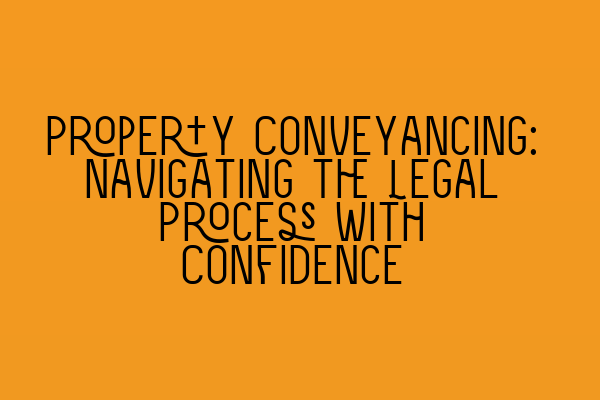Property Conveyancing: Navigating the Legal Process with Confidence
Property conveyancing is an intricate legal process that involves transferring the ownership of a property from the seller to the buyer. Whether you are a first-time homebuyer or a seasoned property investor, understanding the conveyancing process is essential to ensure a smooth transaction and protect your interests.
At SQE Property Law & Land Law, our team of expert solicitors have years of experience in property conveyancing. In this blog post, we will guide you through the conveyancing process step-by-step, providing you with the knowledge and confidence to navigate the legal landscape with ease.
Step 1: Instructing a Property Solicitor
The first step in any property conveyancing transaction is to instruct a reputable property solicitor. A property solicitor acts on your behalf, ensuring all legal aspects of the transaction are handled meticulously. Their expertise and guidance are invaluable throughout the process.
Instructing a property solicitor early on allows them to review the sales contract, carry out essential searches, and provide you with timely advice to protect your interests. They will also liaise with the seller’s solicitor and your mortgage lender to ensure a coordinated and efficient process.
Related Article: Legal challenges in property transactions: A comprehensive guide
Step 2: Conducting Searches and Due Diligence
During the conveyancing process, your solicitor will conduct various searches to uncover any potential issues or legal complications associated with the property. These searches typically include local authority searches, environmental searches, and water and drainage searches.
Furthermore, your solicitor will carry out due diligence, reviewing the property’s title deeds, planning permissions, and any relevant restrictions or covenants. These investigations are crucial to identify any issues that may affect the property’s value or your intended use.
Related Article: Updates in UK Property Laws: Key Changes and Implications
Step 3: Negotiating and Exchanging Contracts
Once all the necessary searches and due diligence are complete, your solicitor will review the contract and negotiate any necessary amendments with the seller’s solicitor. This stage ensures that the contract aligns with your rights and requirements as a buyer.
Once both parties are satisfied with the terms, contracts are exchanged. At this point, you will be legally bound to proceed with the purchase, and the seller must sell the property to you. You will typically pay a deposit to the seller’s solicitor upon exchange.
Related Article: Dominate Property Law Questions: Avoiding Common Pitfalls
Step 4: Completions and Transfer of Ownership
After the contracts are exchanged, your solicitor will finalize the necessary paperwork and arrange for the completion date. On the completion date, your solicitor will transfer the remaining funds to the seller’s solicitor, and in return, you will receive the keys to the property.
Following completion, your solicitor will register your ownership with the Land Registry and update relevant authorities with your new details. This ensures that you are officially recognized as the legal owner of the property.
Related Article: Land Law Revision Tips: Ace Your Exam Preparation
Step 5: Post-Completion Matters
Once the property is officially yours, there are a few post-completion matters that need attending to. These include notifying utility providers of the change in ownership, updating your mailing address, and arranging any necessary insurances for the property.
Your solicitor will guide you through these matters and ensure that all necessary steps are taken to protect your interests as the new property owner.
Conclusion
Property conveyancing can seem daunting, but with the right solicitor by your side, you can navigate the legal process with ease and confidence. By instructing a property solicitor early on, conducting thorough searches and due diligence, negotiating contracts, and finalizing the transfer of ownership, you can ensure a successful property transaction.
If you require expert assistance with property conveyancing, our team at SQE Property Law & Land Law is here to help. Contact us today to discuss your needs and let us guide you through the conveyancing process stress-free.
